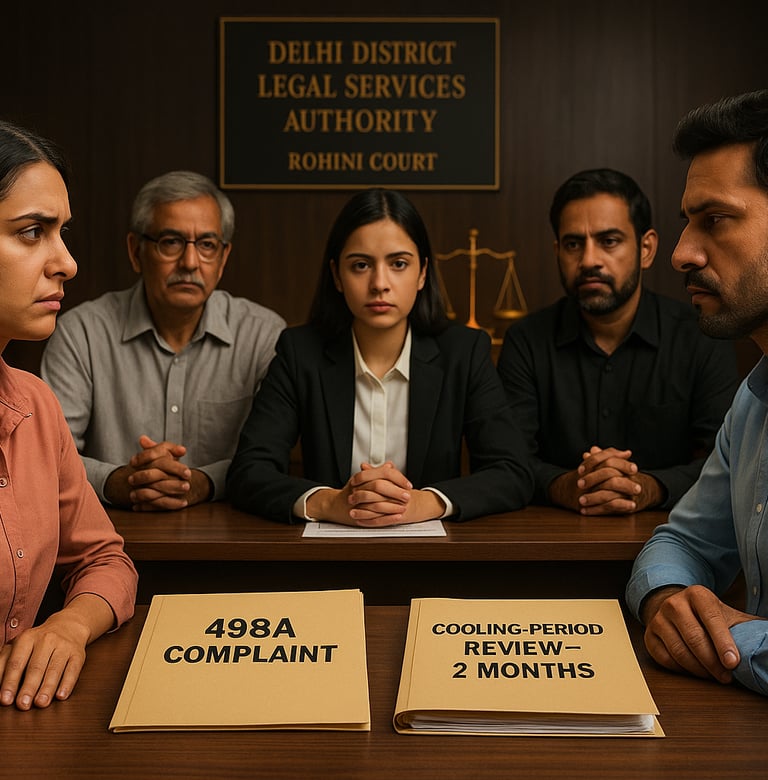Supreme Court Hits Pause on 498A Arrests: Are India’s Anti-Cruelty Laws Being Misused?
The Supreme Court has ruled a mandatory 2-month cooling-off period before arrest under Section 498A IPC. Will this reshape how India handles matrimonial cruelty allegations? Read the full analysis.
Adv. Sachin Gupta | Partner | Altius Astra Attorneys
7/24/20253 min read


In a landmark judgment shaking up the criminal justice approach to matrimonial cruelty cases, the Supreme Court of India has now backed a cooling-off period before any arrests under Section 498A IPC. With this bold move, the Apex Court aims to balance women’s rights with safeguards against false accusations, igniting a national debate: Are anti-cruelty laws being weaponised in India’s matrimonial disputes?
If you're wondering how this affects legal procedures, family dynamics, and gender rights, it’s time to dig deep. Because what the Court just ruled could potentially rewrite the playbook on domestic violence litigation across India.
Section 498A IPC: Between Protection and Prejudice
Section 498A of the Indian Penal Code was enacted to protect women from cruelty by their husbands or in-laws. It was a shield, but over time, courts have increasingly noted its abuse as a sword.
In the case of Shivangi Bansal vs Sahib Bansal [2025 LiveLaw (SC) 735], the Supreme Court endorsed guidelines previously framed by the Allahabad High Court, designed to prevent misuse of 498A and ensure that justice is not rushed, but reasoned.
Primary Legal Shift: No Immediate Arrests, Mandatory Family Welfare Committee Review
In a stern but structured approach, the Court ordered a mandatory “cooling-off” period of two months, during which:
No arrests are to be made.
The case must be referred to a Family Welfare Committee (FWC) constituted under the District Legal Services Authority.
The FWC will investigate, mediate, and file a detailed factual report before any coercive action is taken.
This pause, a legal breather, acts as a filtration mechanism, ensuring that genuine grievances get Justice, and false vendettas get exposed.
A Legal Tug-of-War
The Supreme Court has previously walked a tightrope on this issue. In Rajesh Sharma v. State of U.P. (2017), similar safeguards were framed but later withdrawn in Social Action Forum v. Union of India (2018) due to judicial overreach concerns.
So, what changed?
In Shivangi Bansal’s case, the facts were too brutal to ignore:
The husband was jailed for 109 days, and his elderly father for 103 days, based on unproven charges—including Section 376 (rape) and Section 307 (attempt to murder).
A series of FIRs and domestic violence complaints were filed, clearly reflecting a pattern of vengeful litigation.
The Court observed:
“What they have suffered cannot be resituated or compensated in any manner.”
This isn't just law—it’s a moral reckoning.
How the Family Welfare Committees Will Function: A New Mediation Model
Each district will now have one or more Family Welfare Committees, with members drawn from the legal, social work, and even academic Community.
Here’s how the framework will look:
Composition:
Young lawyers (with <5 years’ experience)
Retired judges
Law students (5th-year)
Recognised social workers
Educated spouses of judicial officers
Process:
Parties summoned with four elderly family members
Committee conducts personal interactions and mediation
No coercive action by police during this time
Final report submitted to Magistrate and IO after 2 months
The entire system is pro bono, focused on restoring matrimonial harmony or confirming irretrievable breakdown.
A Balanced But Bold Approach?
Many legal experts see this as a course correction, not dilution.
Advocate Nadeem Saifi, a family law practitioner at the Delhi High Court, remarks:
“In Divorce battles Section 498A works as a default and deadly weapon. This ruling introduces necessary friction in the FIR-to-arrest conveyor belt, without denying a woman her right to justice.”
Yet, women’s rights activists are divided. Is the cooling-off period a delay in justice or a safeguard against injustice?
What About Genuine Victims?
A natural concern arises: What if the delay endangers real victims?
The Court has carved an exception:
If the FIR includes non-bailable, grave offences (like Section 376 or 307) with credible injury evidence, the case need not wait for the two-month window.
This case-by-case discretion retains the seriousness of genuine violence while filtering out frivolous vendettas.
Real-Life Impact: What to Expect Now?
This ruling won’t just be a headline; it’s a procedural transformation for every 498A complaint moving forward.
For Lawyers:
Expect more referrals to FWCs
FIRs won’t immediately trigger arrests
More scope for pre-trial mediation and settlement
For Clients (both complainants and accused):
Time to reflect before escalation
Opportunity for early reconciliation
But also, possible frustration if delay is misused
For Police:
Can’t arrest without waiting for FWC report
Must document “peripheral” evidence (injury report, witness statements)
Has the Court Restored Justice—or Added Delay?
The Supreme Court’s move may seem controversial, but it’s a cry for nuance in a black-and-white battlefield. By reinstating a structured pause before arrest, the Court signals that every cruelty complaint deserves both compassion and caution.
This is not about protecting the guilty. It’s about protecting the process.
But the question remains:
Will Family Welfare Committees be the guardians of justice, or just another bureaucratic bottleneck?
Only time, and more importantly, implementation will tell.
Altius Astra Attorneys
A premier law firm based in Delhi, India, offering legal representation across various practice areas for citizens rights and interests.
© 2025. Altius Astra Attorneys. All rights reserved.
Contact Us
📞 9899290789, 9818786756
📧 contact@altiusastra.com
3C-ED Block, Madhuban Chowk, Pitampura, Delhi-110034
DISCLAIMER
